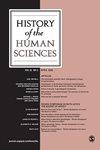所有进步的生命形式都建立在性的吸引力之上":19 世纪末 20 世纪初西欧性学中性本能的发展与社会功能
IF 0.5
2区 历史学
Q2 HISTORY & PHILOSOPHY OF SCIENCE
引用次数: 0
摘要
本文探讨了性科学与人类发展和进步的进化模式之间的关系。它考察了19世纪末和20世纪初西欧性科学家将性本能构建为一种进化力量的方式,这种力量不仅服务于生殖目的,而且对人类社会的社会、道德和文化发展至关重要。性学家通过将性欲与社会性的进化联系起来,挑战了非生殖性行为必然是反常的、病态的或退化的观点,他们经常关注超越生物亲缘关系的关系和关怀形式。因此,非生殖性行为,包括同性恋和非生殖异性恋行为,被解释为为人类发展服务的性本能的表现。这些主张依赖于对性价值观、行为和习俗的跨文化和历史比较,这些比较预演并强化了以种族化、性别化和阶级等级为前提的帝国发展叙事。性科学家根据不同的性行为在进化上的益处绘制了不同的性行为图,根据想象的发展轨迹区分了不同的文化。这些关于性本能及其发展功能的争论起到了至关重要的作用,使性科学成为一个知识领域,承诺提供管理性生活和确保人类文明全球发展所需的专业知识。本文章由计算机程序翻译,如有差异,请以英文原文为准。
‘All the progressive forms of life are built up on the attraction of sex’: Development and the social function of the sexual instinct in late 19th- and early 20th-century Western European sexology
This article explores the relationship between sexual science and evolutionary models of human development and progress. It examines the ways in which late 19th- and early 20th-century Western European sexual scientists constructed the sexual instinct as an evolutionary force that not only served a reproductive purpose, but was also pivotal to the social, moral, and cultural development of human societies. Sexual scientists challenged the idea that non-reproductive sexualities were necessarily perverse, pathological, or degenerative by linking sexual desire to the evolution of sociality, often focusing on forms of relationality and care that exceeded biological kinship. As a result, non-reproductive sexual expressions, including homosexual and non-reproductive heterosexual behaviours, were interpreted as manifestations of a sexual instinct operating in the service of human development. These claims were reliant on cross-cultural and historical comparisons of sexual values, behaviours, and customs that rehearsed and reinforced imperial narratives of development premised on racialized, gendered, and classed hierarchies. Sexual scientists mapped diverse sexual behaviours in terms of their perceived evolutionary benefits, contributing to colonial narratives that distinguished between different cultures according to imagined trajectories of development. These contestations around the sexual instinct and its developmental functions played a vital role in allowing sexual science to authorize itself as a field of knowledge that promised to provide expertise required to manage sexual life and secure the global development of human civilization.
求助全文
通过发布文献求助,成功后即可免费获取论文全文。
去求助
来源期刊

History of the Human Sciences
综合性期刊-科学史与科学哲学
CiteScore
1.60
自引率
11.10%
发文量
31
审稿时长
>12 weeks
期刊介绍:
History of the Human Sciences aims to expand our understanding of the human world through a broad interdisciplinary approach. The journal will bring you critical articles from sociology, psychology, anthropology and politics, and link their interests with those of philosophy, literary criticism, art history, linguistics, psychoanalysis, aesthetics and law.
 求助内容:
求助内容: 应助结果提醒方式:
应助结果提醒方式:


